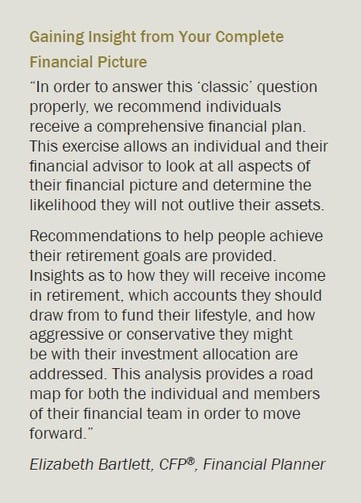4 min read
Considerations for Planning Your Retirement Goals
 Elizabeth Bartlett, CFP®
:
Oct 31, 2023 1:56:05 PM
Elizabeth Bartlett, CFP®
:
Oct 31, 2023 1:56:05 PM

There are many things to look forward to in retirement. Top among them, having more time to focus on personal goals. Whether you plan to spend more time with family, travel, volunteer or pursue a hobby, having the resources available to achieve these goals is of the utmost importance. This commonly leads to a classic question most individuals contemplating retirement ask financial professionals: “Will I have enough money to last through my retirement?”
Unfortunately, there is no short, easy answer to this question — especially without an understanding of a person’s complete financial picture. Current asset level, investment allocation, anticipated income and expenses, taxes, insurance — all these factors and more should be taken into consideration. By taking this holistic approach, financial professionals are able to identify strengths, weaknesses, and opportunities within an individual’s financial plan before responding. 
Tips to help you plan — and achieve — your personal retirement goals
Become familiar with your starting point
Begin by taking inventory of your assets. Create a balance sheet including your various deposit accounts, non-retirement investment accounts and retirement accounts. Factor in any real estate or personal property you own. Perhaps there are business interests or cash value in life insurance policies you will need to include. Next, determine your net worth (the total of all your assets minus your liabilities). Putting together your balance sheet is one of the most important steps you can take to organize your finances and your future.
Once you know your net worth, spend time studying your cash flow. Knowing your total income and being aware of your spending and savings habits is important when planning for retirement. How much are you saving in your retirement plan? How much are you saving in non-retirement investment accounts? What portion of your spending is being allocated toward fixed, variable and discretionary expenses? Understanding where your money goes and giving each dollar a purpose can help you work toward your retirement goals.
Once you understand your balance sheet and cash flow statement, you can take a proactive approach as you prepare for retirement by:
-
Setting short-term and long-term financial goals
-
Creating or adjusting your budget and savings strategy
-
Monitoring your spending and tracking all your bank accounts, investments, loans, credit cards, real estate holdings, personal property, business valuation, insurance policies, and more
Think about where you are headed
Ask anyone who is retired — most will tell you getting to and through retirement is a journey that requires planning, persistence, and preparation your entire adult life. You will have many questions along the way, ones that only you can answer:
-
When would you like to retire? Your age of retirement may have a significant impact on your anticipated income, personal expenses, investment choices, and asset level.
-
How will your lifestyle change as you enter retirement? Consider how you would like to spend your retirement years (e.g., traveling abroad, purchasing a vacation home, volunteering for a favorite cause, pursuing a hobby, starting a new business, enjoying time with family and friends, etc.).
-
What does a typical day in retirement look like for you?
-
What do you hope to embrace or avoid during your retirement years?
Determine how to prepare
Give some thought regarding what your retirement budget will look like and how your personal finances will change:
-
How heavily will you rely on your savings to supplement your income in order to fund the lifestyle you desire?
-
Is this long-term level of distribution of your accumulated savings sustainable?
-
What sources of income do you anticipate (e.g., Social Security, pension, investment income, part-time employment, etc.)?
-
Have you included escalating costs associated with health care insurance and medical emergencies in your budget?
-
Are you prepared for an unforeseen financial event?
In addition to your retirement budget, consider your current investment allocation and whether your existing strategy makes sense long-term based on your future goals. Review the purpose of existing life insurance policies. Evaluate your options with regard to Social Security benefits and Medicare plans. The list goes on and on.
There are numerous things to consider as you prepare for retirement, which is why many individuals seek guidance from financial professionals to help them navigate this phase of life.
In a recent survey, nearly all working respondents (95%) believe financial help is important to prepare for retirement.¹
Consider seeking help with your retirement goals
Perhaps this is the most important step of all — you do not have to make this journey alone. Working with a team of financial professionals who are highly knowledgeable in their field is invaluable. If you do not have a financial plan in place, a financial professional can help you create one.
If you already have a plan, members of your financial team will be able to work together and offer insight to help you achieve your retirement goals.
-
Tax professionals may work with your portfolio manager and advisor to determine the most tax-efficient method to receive income in retirement.
-
A financial planner may provide insight to the portfolio manager regarding asset allocation and your need for growth vs. income in your portfolio.
-
A private banker may work with your financial planner to determine the most optimal lending option.
-
An estate planning attorney may partner with a trust advisor to discuss legacy planning.
Next steps
We think it bears repeating: Working with a team of financial professionals who are highly knowledgeable in their field is invaluable when it comes to planning your retirement and helping you achieve your financial goals. Because everyone’s vision for retirement is unique, it is important to work with financial professionals you can trust to help you choose the options best suited for your financial situation. Contact Commerce Trust today.
¹ GSAM Insights, https://www.gsam.com/content/gsam/us/en/institutions/market-insights/gsam-insights/2022/retirement-survey-insights-2022.html Retirement Survey & Insights Report 2022,” October 12, 2022.
Certified Financial Planner Board of Standards, Inc. (CFP Board) owns the certification marks CFP® and CERTIFIED FINANCIAL PLANNER™ in the United States, which it authorizes use of by individuals who successfully complete CFP Board’s initial and ongoing certification requirements.
The opinions and other information in the commentary are provided as of March 15, 2023. This summary is intended to provide general information only, and may be of value to the reader and audience.
This material is not a recommendation of any particular investment or insurance strategy, is not based on any particular financial situation or need, and is not intended to replace the advice of a qualified tax advisor or investment professional. While Commerce may provide information or express opinions from time to time, such information or opinions are subject to change, are not offered as professional tax, insurance or legal advice, and may not be relied on as such.
Past Performance is not a guarantee of future results. Diversification does not guarantee a profit or protect against all risk.
Data contained herein from third-party providers is obtained from what are considered reliable sources. However, its accuracy, completeness or reliability cannot be guaranteed.
